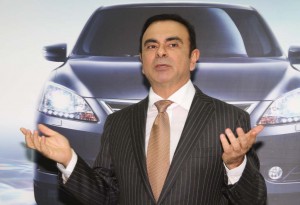
Renault-Nissan Alliance CEO Carlos Ghosn said he believes a lack of infrastructure is to blame for missing his target of selling 1.5-million electric vehicles.
Nissan/Renault won’t meet Chief Carlos Ghosn’s ambitious goal of selling 1.5 million electric vehicles by 2016. In fact, it will not even be close.
The Japanese/French automotive alliance will miss that target by more than 1 million vehicles as it has sold about 120,000 EVs, most of them Nissan Leafs. Ghosn now believes it will take much longer to reach the 1.5-million unit goal.
“We will not be there. At the speed right now, I’m seeing it more four or five years later,” he said in an interview with Financial Times. During the Frankfurt Motor Show in September, Ghosn said he believed that EVs would account for 10% of all new vehicle sales at some point in the future with the right level of support from governments in China, the U.S. and Europe.
Currently, sales hover near the 4% range in the U.S. and in most other markets.
There have been some obstacles that make it tough to sell enough cars to make Ghosn’s larger-than-life prediction come true, including getting batteries for the Leaf. However, he believes the biggest factor is an issue beyond the control of Nissan/Renault and other automakers.
“I don’t think the main issue today is the cost of the car,” he said in the interview. “The main issue is infrastructure. It is normal. I would not buy a gasoline car if there were no gasoline stations. We have to admit, it is slower than we thought. But it is slower for the reason that we thought infrastructure building would be faster. It is not.”
Even when the infrastructure improves, the number of competitors Nissan/Renault faces will be larger than ever. The maker already deals with stiff competition from the Chevrolet Volt. However, the Tesla Model S is attracting attention with its high-end luxury sedan, plus it plans to introduce a lower-cost model, the Model X, in the next 18 to 24 months.
Ford has a Focus EV and BMW recently introduced the i8 at to the world and plenty of automakers have announced their intentions to put a serious effort into getting a viable EV into the marketplace in the coming year. Ghosn brushes much of that aside.
“Today there is nobody, but they are coming,” he said. “Some of our German competitors have announced that they are coming. They will be our main competitors. And that’s about it. Others have announced one car here, one car there.”
(Renault-Nissan partnering with Mitsubishi. For more, Click Here.)
It should be noted that Nissan/Renault isn’t just sitting idly by waiting for more charging stations to show up around the world. It’s actively involved in trying to develop that infrastructure through programs with other automakers in Japan and the United States.
Additionally, it recently announced plans to enter into a partnership with Mitsubishi Motors to develop and produce a variety of small cars, including an EV.
(Click Here to read about Nissan’s earnings and management changes.)
Nissan already partners with Mitsubishi in a joint venture called NMKV. The new proposal would see them jointly developed a new small car that they could sell globally, including the EV version.
The proposed partnership comes along at a critical time for all three companies. The makers have each staked out a major role in the nascent electric vehicle market but have been struggling as sales lag initial expectations.
Renault and Nissan have invested billions into EV development in recent years. While many are familiar with the Leaf, Renault also has the ZE family of EVs, including the Twizy, Fluence ZE, Kangoo ZE and ZOE.

I doubt this is a surprise to anyone with a clue. I suspect his overly optimistic previous projections were ignored by most. Nissan/Renault may never reach the stated goal with the issues EVs have.